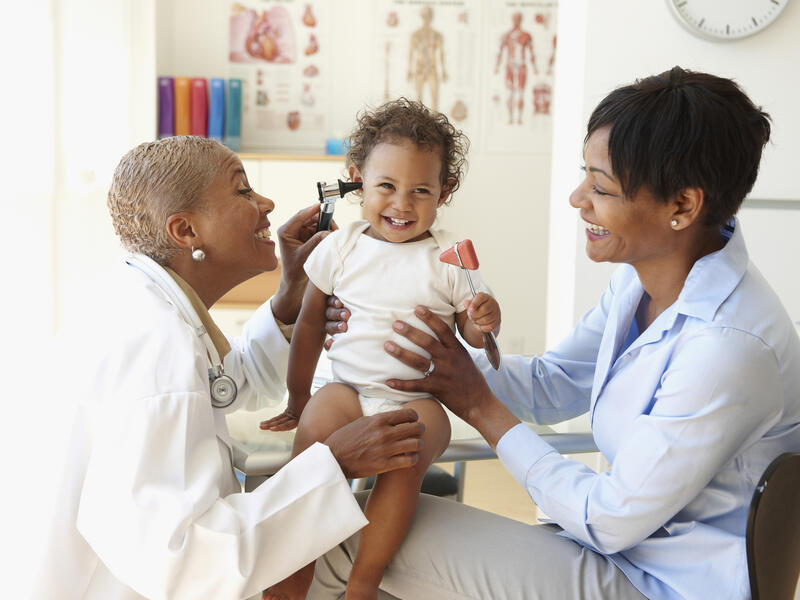Your little one is having a big birthday. That first year goes so fast and is accompanied by so many changes. All of a sudden, it’s time for their 12-month checkup.
What can you expect at this checkup?
Your doctor will likely check weight, length and head circumference to compare with growth charts for normal development. Your doctor will also do a physical examination, update immunizations and, if warranted, order tests if your child appears to be at risk. According to the American Academy of Pediatrics guidelines, tests may include a hemoglobin, lead level in blood, and, in high-risk populations, TB screening. This check-up is also the optimal time for both you and your doctor to ask questions and address any concerns you may have.
Developmental milestones
At 12 months of age, your doctor will ask about the following developmental milestones.
- Says “mama” and “dada” plus one or two other words
- Points at objects
- Able to stand alone
- Walks with one hand and possibly walk alone
- Picks up a small object between the thumb and index or middle finger
- Feeds self with hands
- Enjoys peek-a-boo, pat-a-cake and social games
Do not panic if your baby is not doing all these things. Every baby develops at different stages and at their own pace. Feel free to talk to your doctor if you are concerned about development in any of these areas at any time.
Advice on daily routines
Feeding:
- Give your child whole milk until 2 years of age
- Limit cow milk to 16 ounces daily
- Juice in cup and limit up to 4 ounces
- Serve iron-fortified food like cereal, sweet potatoes, strawberries
- Encourage self-feeding
- Serve three meals and two to three nutritious snacks a day
- Avoids food with choking hazard such as whole grapes, seeds, raisins, popcorn, nuts, hot dogs, meat chunks, hard fruits
Learning:
- Make time to talk, read and interact with them
- Maintain good eye contact
- TV viewing and other screen time should be very limited until after 2 years
Sleeping:
- Have a regular bed time and make it a routine for your baby
- Put your baby to bed while they are still awake, so that they will learn to sleep in their own bed
Dental hygiene:
- Use soft tooth brush to brush once or twice daily
- Make a dentist appointment at 1 year of age or when first tooth erupts
Safety near water:
- Never leave the child unattended
- Close the bathroom doors
- Keep toilet seats down
- Empty small tubs, buckets if not needed
Household precautions:
- No active or passive smoke exposure at home
- Block the stairs with stair gates
- Put socket plugs in electrical outlets
- Secure furniture, TV and shelves to floor to avoid risk of falling
- Pad sharp corners of furniture, counters and fireplace hearths
- Drapes, blinds and cords tied up and out of reach
Drugs and guns:
- Common medications and liquids should be properly stored and locked with baby safety locks
- Children should not have any access to drugs, chemicals or liquids in the garage, basement or bathrooms
- Guns should be stored safely and unloaded with ammunition stored separately
- Keep emergency contact numbers in speed dial like poison control (800) 222-1222, nurse, doctor, nearby relatives and friends
Red flags:
- Does not use any single words, like “mama,” “dada”
- Does not maintain eye contact
- Does not point at objects
- Does not babble
- Has difficulty crawling or walking
- Has single hand preference
If you notice any of these red flags by your child’s first birthday, talk to your pediatrician to set up an evaluation.
You are embarking on the next phase, moving from having a dependent baby to having an independent toddler whose new accomplishments will delight you daily and whose constant activity will keep you on your toes.
Learn more
- Well child visits important for children of all ages
- Vaccination FAQs and when kids need each shot
- Diagnosing, managing a child’s developmental disabilities
…
Posted In Children's, Family Medicine, Health Information, Parenting
